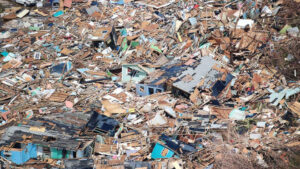Home » Commentary » Opinion » Wait until we emerge from shelter – and see the economic damage done
· Spectator
 If we think of coronavirus as a severe tropical cyclone, when it passes and we venture outside to survey the wreckage it will be impossible not to see the enormous damage to the country’s public finances.
If we think of coronavirus as a severe tropical cyclone, when it passes and we venture outside to survey the wreckage it will be impossible not to see the enormous damage to the country’s public finances.
Federal and state governments are spending a great deal more, while their revenues take a hit.
As this fiscal incontinence continues, it won’t be long before a greatly increased level of public debt becomes an unavoidable legacy of the crisis.
Australia’s pre-crisis gross general government debt stood at more than $800 billion or about 43 per cent of GDP – about three-quarters of it Commonwealth and one-quarter state.
After 10 years of rapid increase, the Commonwealth was flattening the curve (to borrow a term currently in vogue), but state debt was set to increase by roughly $100 billion in three years to finance an infrastructure splurge. The net result would have been an increase in the dollar amount of debt, but stabilisation as a percentage of GDP – albeit at a historically high level.
Those projections have now gone out the window. While any calculations at this stage are ‘back of the envelope’, it is not difficult to see total debt increasing by 10–15 percentage points of pre-crisis GDP (let alone shrunken post-crisis GDP), taking it quite rapidly to 53 — 58 per cent of GDP.
This would still be well below the average of G20 advanced economies (currently 113 per cent, and surely set to surge). Some will draw comfort from this international comparison, but there is no escaping the reality that a higher level of debt will constrain our governments’ policy choices, risk credit rating downgrades and leave us even more exposed to a future crisis.
An increase is inevitable, but it can be minimised by stopping this misguided economic shutdown as quickly as possible; ending the associated economic rescue spending much earlier than currently envisaged — and ensuring none of it becomes permanent.
Wait until we emerge from shelter – and see the economic damage done